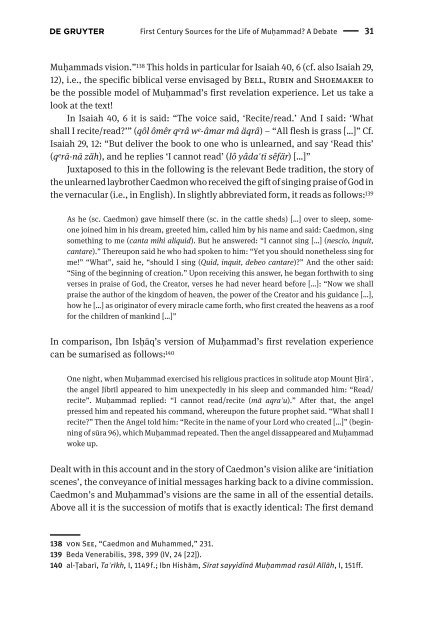0021-1818_islam_98-1-2-i-259
0021-1818_islam_98-1-2-i-259
0021-1818_islam_98-1-2-i-259
You also want an ePaper? Increase the reach of your titles
YUMPU automatically turns print PDFs into web optimized ePapers that Google loves.
First Century Sources for the Life of Mu1ammad? A Debate 31<br />
Mu1ammads vision.” 138 This holds in particular for Isaiah 40, 6 (cf. also Isaiah 29,<br />
12), i.e., the specific biblical verse envisaged by Bell, Rubin and Shoemaker to<br />
be the possible model of Mu1ammad’s first revelation experience. Let us take a<br />
look at the text!<br />
In Isaiah 40, 6 it is said: “The voice said, ‘Recite/read.’ And I said: ‘What<br />
shall I recite/read?’” (qôl ômêr q erâ w e-âmar mâ äqrâ) – “All flesh is grass […]” Cf.<br />
Isaiah 29, 12: “But deliver the book to one who is unlearned, and say ‘Read this’<br />
(q era-na zäh), and he replies ‘I cannot read’ (lô yâda^ti sêfär) […]”<br />
Juxtaposed to this in the following is the relevant Bede tradition, the story of<br />
the unlearned laybrother Caedmon who received the gift of singing praise of God in<br />
the vernacular (i.e., in English). In slightly abbreviated form, it reads as follows: 139<br />
As he (sc. Caedmon) gave himself there (sc. in the cattle sheds) […] over to sleep, someone<br />
joined him in his dream, greeted him, called him by his name and said: Caedmon, sing<br />
something to me (canta mihi aliquid). But he answered: “I cannot sing […] (nescio, inquit,<br />
cantare).” Thereupon said he who had spoken to him: “Yet you should nonetheless sing for<br />
me!” “What”, said he, “should I sing (Quid, inquit, debeo cantare)?” And the other said:<br />
“Sing of the beginning of creation.” Upon receiving this answer, he began forthwith to sing<br />
verses in praise of God, the Creator, verses he had never heard before […]: “Now we shall<br />
praise the author of the kingdom of heaven, the power of the Creator and his guidance […],<br />
how he […] as originator of every miracle came forth, who first created the heavens as a roof<br />
for the children of mankind […]”<br />
In comparison, Ibn Is1aq’s version of Mu1ammad’s first revelation experience<br />
can be sumarised as follows: 140<br />
One night, when Mu1ammad exercised his religious practices in solitude atop Mount 0ira#,<br />
the angel Jibr\l appeared to him unexpectedly in his sleep and commanded him: “Read/<br />
recite”. Mu1ammad replied: “I cannot read/recite (ma aqra#u).” After that, the angel<br />
pressed him and repeated his command, whereupon the future prophet said. “What shall I<br />
recite?” Then the Angel told him: “Recite in the name of your Lord who created […]” (beginning<br />
of sura 96), which Mu1ammad repeated. Then the angel dissappeared and Mu1ammad<br />
woke up.<br />
Dealt with in this account and in the story of Caedmon’s vision alike are ‘initiation<br />
scenes’, the conveyance of initial messages harking back to a divine commission.<br />
Caedmon’s and Mu1ammad’s visions are the same in all of the essential details.<br />
Above all it is the succession of motifs that is exactly identical: The first demand<br />
138 von See, “Caedmon and Muhammed,” 231.<br />
139 Beda Venerabilis, 3<strong>98</strong>, 399 (IV, 24 [22]).<br />
140 al-Tabar\, Ta#rikh, I, 1149f.; Ibn Hisham, Sirat sayyidina Muhammad rasul Allah, I, 151ff.


